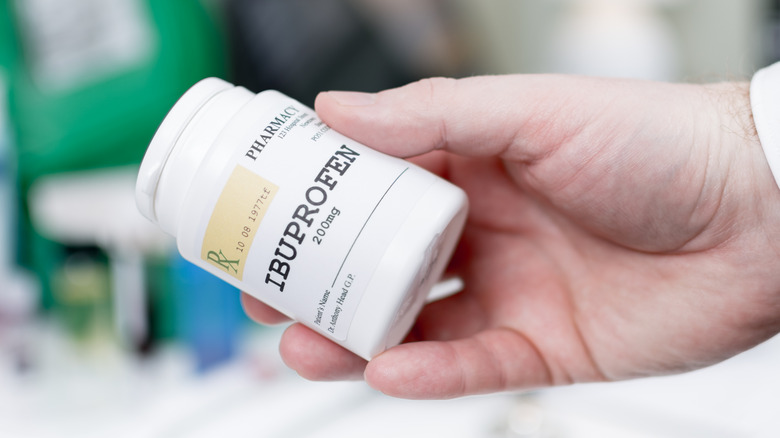Think Twice Before Taking Ibuprofen If You Have This Common Infection
Waking up in the morning, you notice it hurts a bit when you use the bathroom. By the time the evening hits, it feels like fire when you urinate. According to the Urology Care Foundation, urinary tract infections (UTIs) are a common ailment, sending more than 8.1 million people to the doctor's office annually. Per statistics, about 40% of women and 12% of men experience UTI symptoms within their lifetime.
Uncomplicated UTI infections typically happen in the bladder and urethra when outside bacteria make their way in. It's more common in women than men due to the anus being a shorter distance from the urethra. However, the Mayo Clinic notes that those who are sexually active, use a diaphragm, have a suppressed immune system, use a catheter, and are going through menopause might be more likely to get a UTI than others. UTI symptoms include a strong urge to go, a burning feeling when urinating, urinating often, cloudy urine, and pelvic pain.
A paper published by BMC Medicine in 2010 showed that ibuprofen might be a treatment option for an uncomplicated UTI. However, new research suggests you think twice about using ibuprofen over antibiotics.
Why ibuprofen isn't the best medication for a UTI
Looking at both sides of an argument is essential to making an informed decision. The aforementioned research published in BMC Medicine comparing ibuprofen to ciprofloxacin suggested that for uncomplicated UTI treatment, the former wasn't inferior to the latter. However, the study was relatively small; additionally, 33% of the ibuprofen group eventually did have to receive antibiotics.
Furthermore, a more recent study found ibuprofen inferior to specific antibiotics. Research published in 2015 in the British Medical Journal showed that taking ibuprofen over fosfomycin significantly increased the total burden of the infection. As Dr. Catherine Sherwin, professor and Chief of the Division of Clinical Pharmacology, Department of Pediatrics, University of Utah School of Medicine, told The Healthy, "There's conflicting evidence in the literature on the effectiveness of ibuprofen, and it's dependent on the antibiotic with which it's compared."
Moreover, a study in PLoS Medicine found that women take longer to recover from the infection when taking ibuprofen compared to pivmecillinam. Seven of the 181 women in the PLoS study taking ibuprofen experienced a complication known as pyelonephritis, which is where the bacteria work their way into the kidneys. Thus, the researchers concluded that ibuprofen isn't a viable alternative, since you can't identify which patients will develop a secondary infection.
The importance of finding alternative treatments for UTI
Cases of recurrent UTIs happen all over the globe. Over time, the bacteria that cause UTIs get savvy to the treatment method and become antibiotic-resistant.
Research published in the International Journal of Health Sciences showed that 92% of UTI-causing bacteria are resistant to at least one treatment antibiotic. "Antibiotic resistance is a huge problem for UTIs, compared to other infections, because UTIs are so common," Lisa Bebell, an infectious disease physician at Massachusetts General Hospital, told Scientific American. "So we see the effects of antibiotic resistance much more immediately and with a higher prevalence."
Since alternatives to antibiotic treatment are still being researched, it's best to use a few prevention methods to help keep you UTI-free. According to the Centers for Disease Control and Prevention, urinating after sex, staying hydrated, and taking showers can help. Wiping from front to back is also important to avoid bringing fecal material toward the urethra. Additionally, research published in Clinics (Sao Paulo) showed cranberry products might be helpful in treating and preventing UTIs. Per the study's findings, administering 240 to 300 milliliters of cranberry juice cocktail every day "can prevent 50% of the recurrences of UTIs and can reduce bacteriuria." So, it might be worth a try to help get that UTI out of your system.


